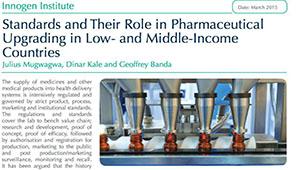You are here
- Home
- blog_categories
- Making Medicines in Africa
- Pharmaceutical Standards: A Challenging Balancing Act - Dinar Kale
Pharmaceutical Standards: A Challenging Balancing Act - Dinar Kale
26 June 2015

Drawing on a pilot study carried out in India, Kenya and South Africa with funding from IKD, a new policy brief from Innogen, Standards and Their Role in Pharmaceutical Upgrading in Low- and Middle-Income Countries, reveals that pharmaceutical standards have emerged as an undesirable barrier to market entry for firms based in African countries, which in turn impacts on development, health delivery and access to medicines. The financial cost and technical knowledge associated with complying with technology standards remains a significant challenge for developing country firms looking to upgrade their manufacturing facilities. This has created a major policy challenge for policy makers and regulators around the world, who want to facilitate the development of standards that will ensure safe, effective and quality products without their acting as barriers to development of local industries in African countries.
There is a wide consensus in the health system community that pharmaceutical standards remain indispensable in ensuring supply of safe, effective and quality healthcare. This understanding has led to the establishment of strict product, process, marketing and institutional standards governing each stage of medicine development and delivery. But the impact of these remains questionable. For example, in the case of low-income countries the World Health Organisation (WHO) estimates that about 25 per cent of the medicines consumed are counterfeit, which highlights the gravity of the challenges involved in creating appropriate frameworks. The responsibility of implementation, monitoring and enforcement of standards rests with the national governments, which in turn raises issues about their governance capacity. Low-income countries are typically 'standard takers' rather than 'standard makers', with international institutions such as WHO acting as a technical agency responsible for setting standards, normative guidance and establishing best practice. Evidence suggests that African countries need knowledge and infrastructural assistance in creating effective and appropriate governance infrastructure.
The study on which the Innogen brief was based points out that the ever-increasing role of standards and African countries’ lack of 'power' in setting them has implications for both pharmaceutical capability upgrading and health delivery systems. Some respondents argued that in terms of markets, standards were often used as a convenient and suave trade tool – as well as a politically correct technical tool – to create barriers to entry for developing country manufacturers, especially in the quest of these to win international tenders for medicines and other medical products. An industry respondent from India noted that while on one side standards have emerged as an integral part of quality healthcare, 'on another hand they are also viewed as a tool used to maintain prevalent global monopolies'. For example, although the internationally agreed standards are not legally binding rules, when they are linked with tenders, punitive actions and sanctions, they can – and do – act as an instrument of exclusion.
Pharmaceutical firms based in low- and middle-income countries accept that standards are important, but they bemoan their absence of financial and knowledge resources, which highlights that policy makers urgently need to engage with the everyday realities of drug availability and use in low-income countries. There is, therefore, a need to introduce clear roadmaps that show a gradual strengthening of the requirements for standards, a strengthening that is driven by local or regional regulatory institutions.
There are two key issues that need serious consideration. The first relates to the current appropriateness of pharmaceutical standards to African country contexts, and the second relates to the governance capabilities of African countries in implementing these standards. It is clear that in order to develop and sustain local pharmaceutical production capabilities, developing countries will need to establish and maintain a delicate balance between devising agile regulatory frameworks that are backed by a clear understanding of standards and their role in crafting appropriate technical, social, economic and policy conditions, yet at the same time will not compromise the provision of safe, efficacious and affordable healthcare products to local populations.
Dinar Kale is a Senior Lecturer in International Development and Innovation at the Development Policy and Practice group in the Department of Engineering and Innovation. One of the co-authors of the Innogen briefing, his work involves understanding the issues that help or hinder the development of healthcare industries in developing countries.
Share this page:
Contact us
To find out more about our work, or to discuss a potential project, please contact:
International Development Research Office
Faculty of Arts and Social Sciences
The Open University
Walton Hall
Milton Keynes
MK7 6AA
United Kingdom
T: +44 (0)1908 858502
E: international-development-research@open.ac.uk
.jpg)